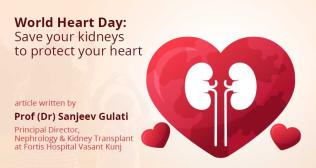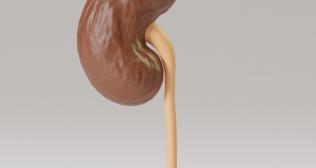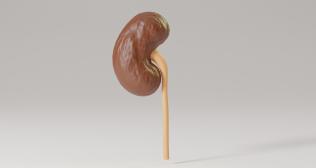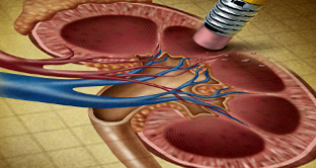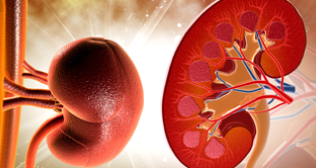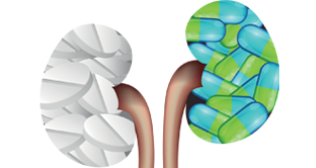
Raising Awareness for Kidney Disease: The Importance of Early Detection in 2025
Kidneys are the vital organs of the urinary system that help your body eliminate toxins by filtering waste and balancing fluids. As blood circulates to the body, it transports waste substances produced by the cells. The kidneys filter out toxins and excess water from the blood, converting them into urine for elimination. In addition to purifying the blood, the kidneys release hormones and stimulate the production of red blood cells. Impairment in the kidney function can lead to kidney disease. Globally, millions of people are known to be affected by kidney disease and spreading awareness about regular screening and early detection is critical to protect kidney health.
To highlight the critical importance of kidney health worldwide, March 13th 2025, is observed as World Kidney Day. This year’s theme includes ‘Prioritising Early Detection for Healthy Kidneys’. The theme underscores the significance of identifying kidney disease early and preventing it from becoming chronic.
Types of kidney disease
There are several types of kidney diseases, each affecting the kidneys in different ways. Some common types of kidney diseases include:
- Acute kidney disease: An acute kidney disease is a temporary impairment of renal function that lasts shorter than 3 months. It usually manifests quickly because of kidney injury, drugs, kidney obstruction or other factors. Some individuals may need a short course of dialysis to help their kidney to recover. Many patients recover completely from an acute kidney injury and go on to lead regular lives. However, if severe damage has occurred, there is a greater risk of having chronic kidney disease.
- Chronic kidney disease (CKD): A progressive condition where the kidneys gradually lose their ability to filter waste from the blood. Chronic kidney diseases are referred to when the kidney damage is persistent for three or more months with an estimated glomerular filtration of less than 60 mL/min/1.73 m². Chronic kidney disease treatment often involves long-term dialysis or renal transplantation.
- Polycystic kidney disease (PKD): A genetic disorder characterised by the growth of numerous cysts in the kidney. Over time, these cysts can cause the kidney to enlarge and lose function, resulting in renal failure. The presence of numerous large cysts can cause chronic kidney disease, leading to kidney damage. However, the severity of PKD can vary and is known to be non-cancerous.
- Glomerulonephritis: Inflammation of the kidney filtering unit called glomeruli is referred to as glomerulonephritis. This condition includes a subset of renal disease that can lead to various symptoms, such as proteinuria and haematuria.
- Kidney stones: Hard deposits of minerals and salts that form inside the kidney are kidney stones. Crystallisation of substances such as calcium, oxalate and uric acid in the urine can lead to the formation of kidney stones. These stones vary in size from tiny grains to larger stones that cause significant discomfort.
Symptoms of kidney disease
The symptoms of kidney diseases vary according to specific conditions. Here are some of the symptoms:
- Loss of appetite
- Fatigue
- Nausea and vomiting
- Confusions
- Painful or frequent urination
- Swelling of ankles
- Cramps
- Blood in urine
- Itchy skin
- Poor appetite
- Frequent urination
- Foamy urine
Causes of kidney disease
The causes of kidney disease include:
- Diabetes
- Bladder diverticula
- Dehydration
- Enlarged prostate
- Neurogenic bladder
- Glomerulonephritis
- Polycystic kidney disease
- Kidney infection
- Nephrotic syndrome
- Augmentation cystoplasty
Complications of kidney disease
If kidney diseases are left untreated, they can become chronic kidney disease, leading to many complications. Some of them include:
- Anaemia
- Weak and brittle bones
- Gout
- High blood pressure
- Nerve damage
- Fluid build-ups
Importance of early detection of kidney disease
Early diagnosis allows for timely treatment intervention and delays or prevents the progression of the disease and its associated complications. The prevalence of chronic kidney disease is on the rise, driven by the increasing prevalence of risk factors such as diabetes, hypertension and ageing. Unfortunately, the early stages of kidney disease often lack overt symptoms, making it challenging for individuals to recognise the problem. However, there are certain tests that can detect kidney disease in its early stages, allowing for prompt management and potentially slowing disease progression.
- Urine test: This involves urinalysis in a lab to check for blood, stone-forming crystals and any signs of infections in your urine.
- Imaging: Imaging tests are performed, such as X-rays, CT scans and ultrasound, which help to identify and see the size, shape, location and number of kidney stones present.
- Blood tests: This test is advised to check kidney functions, detect infections and look for calcium and creatinine levels.
Kidney disease treatment
Certain types of kidney diseases are treatable with medications, surgery and lifestyle modifications. In some cases, treatment may help to restore some kidney function, but there is no cure for chronic kidney disease. The goals of chronic kidney disease treatments are to alleviate symptoms, prevent the condition from worsening and reduce complications. The treatment may vary based on the stage, severity and type of kidney disease. Here are some of the general treatments related to kidney disease.
- Dialysis: It is a technique used to filter blood in the absence of kidneys. There are mainly two types of dialysis,
- Haemodialysis: It is a method where a machine filters the blood in the body regularly. It has to be carried out every three to four days a week.
- Peritoneal dialysis: This is a method where a bag is attached with a dialysis solution to a catheter in the abdominal lining of your body. The solution that is attached will flow into the abdominal lining, called the peritoneum, which will undergo a process called osmosis and diffusion to remove the waste products and extra fluid in our body.
- Medications: These include medications such as antihypertensives and oral hypoglycaemic agents. As hypertension can lead to complications of chronic kidney disease, antihypertensives control the blood pressure and also reduce protein levels in urine, which can protect the kidneys over time. Diabetes medications have been shown to slow kidney disease progression, even in people without diabetes.
- In addition, individuals with chronic kidney diseases have the risk of developing heart diseases such as heart attacks and stroke. To mitigate the risk, the doctors can prescribe medications to lower the cholesterol.
- Further, anaemia is another complication developed by people with advanced chronic kidney disease. To address this, the doctors prescribe medications to stimulate red blood production.
- Lifestyle changes: Individuals have to modify their lifestyle if diagnosed with kidney disease. These may include smoking cessation, avoiding alcohol, limiting salt intake, performing regular exercise and avoiding painkillers or non-steroidal anti-inflammatory drugs unless advised by your doctor.
Conclusion
Kidney disease is often treatable, while chronic kidney disease is a long-term kidney issue that requires treatments like dialysis n. When it is left untreated for many days, the condition gets worse, and treatment like kidney transplantation is performed to permanently cure the condition.







